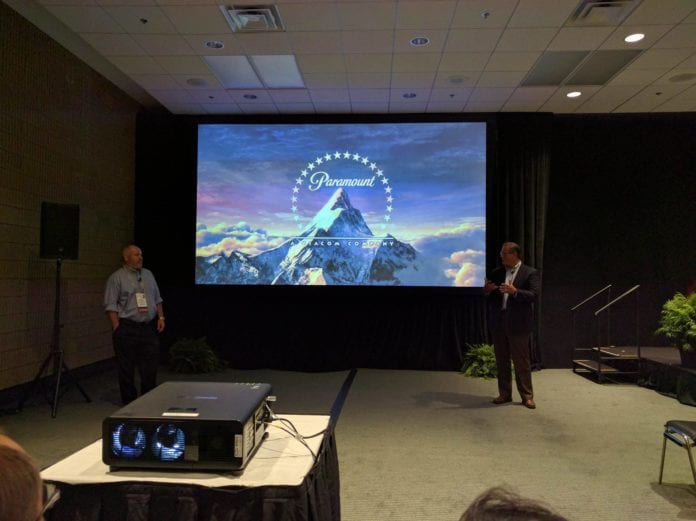Paramount tackles big data with analytics
ATLANTA – Joe Churchill, VP of analytics at Paramount Pictures, and Chris Twogood, VP of product and services marketing at Teradata, co-hosted a panel titled Paramount’s Journey into the Cloud at the Teradata PARTNERS 2016 conference in Atlanta. Paramount is well known for its film productions, consistently being ranked as one of the “Big Six” film studios in Hollywood. It is now starting its journey into analyzing big data.

For decades, Paramount conducted profitability analysis and sales analysis on DVDs as well as its television channels. It has recently replaced that data with a digital- and consumer-based view of customers, using higher volume data that gets down to the data generated from each user looking at its websites. It allows visibility into who is streaming, who downloaded its apps, what they are looking at, which ads are effective, what viewers look at first, what they look at second and more.
The company chose Amazon’s Simple Storage Service and Teradata’s analytics platform to manage years of data captured by Paramount. The solution went live just a few months ago.
“We are really trying to get to understanding consumers,” Churchill said. “With DVD sales we don’t have that information.”
A solution, and potential for expansion
The company needed its infrastructure to be upgraded on a large scale with the anticipation of increased workload. It used Teradata NPARC to transfer its old data over, enabling its hybrid cloud in three months.
“Overall, the experience has been very positive,” Churchill said. “Consumers didn’t notice any outage, and have noticed boosts in some of the queries. As we continue to collect data we will definitely need to expand. I can envision a time when we need to expand capacity.”
Maersk and data visualization
The Danish shipping company Maersk Line operates in over 130 countries and owns more than 600 container vessels. The largest shipping company in the world transports goods with an estimated yearly value of $675 billion.
Jan Voetmann, engagement director at Maersk Analytics hosted a panel titled Culture Eats Data for Breakfast: Inside the Maersk Analytics Journey at Teradata PARTNERS 2016. He spoke about how Maersk is approaching data analytics to overcome an industry demand growth that is still at its lowest since the financial crisis, all while keeping the company’s stringent values in mind.
Challenges
The current problem Maersk faces is that the gross domestic product-to-demand growth multiplier is decreasing.
“The product we have in our industry is unchanged for years and we have the problems of overcapacity,” Voetmann said. “When you have overcapacity prices go down.”

They are also now competing with the largest marketplace and cloud operator in the world: Amazon.
“Amazon is the competition, not just one of our own direct competitors. Amazon moves boxes, and has a huge amount of data and complexity,” Voetmann said. “We are going to compete with Amazon, and that is just a different game.”
Voetmann went on to discuss Maersk’s strict company values:
- Constant care: take care of today, actively prepare for tomorrow.
- Humbleness: listen, learn, share and give space to others.
- Uprightness: word is our bond.
- Our employees: attract and retain the right people, build right team.
- Our name: sum of our values.
Data-based solutions
And the main focus areas of the company:
- Customer: Behavior, retention, satisfaction, segmentation, profitability;
- Bunker: Consumption, optimization, procurement;
- Equipment: Relocation, repairs, total costs of ownership;
- Vessels: Sensors, predictive maintenance, voyage optimization;
- Sales: Revenue optimization, demand forecasting; and
- Intelligence: Utilization, pricing, deployment.

The image above shows the roles of analytics at Maersk in three parts:
- Operational optimization
- Bunker savings
- Container relocation and repair
- Automated stowage
- Predictive maintenance – vessels and containers
- Commercial opportunities
- Which customers to target – how to reach
- Optimize cargo mix within constraints
- Provide sales leads at right time
- Intelligent pricing
- Data-fueled services
- Tbd

The image above shows a visualization detailing the route of all empty shipping containers. It gave Maersk the visibility it needed to determine which of its ships were being underutilized, or even wasteful. The better repositioning of empty containers will save millions of dollars, according to Voetmann.
The panel host said that decision-making is reaching a new stage: It has gone from gut feelings to a combination of computer and brain power to now being about the man and the machine.

